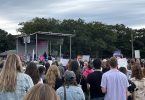By Devyani Chhetri
BU News Service
BOSTON – Grants amounting nearly $2.7 million awarded to the Boston Police Department are under the microscope amid nationwide protests against racism and police brutality.
City councilors scrutinized two state department grants and one federal grant Thursday, funding anti-gang, anti-crime and anti-terrorism interventions administered by police department.
One of these grants, worth $850,000, is earmarked for the Boston Regional Intelligence Center, the police department’s anti-terrorism unit, whose data can be accessed by the Department of Homeland Security and Federal Bureau of Investigation.
The unit drew controversy in the past after a lawsuit by the American Civil Liberties Union revealed that inaccurate data from the Boston Regional Intelligence Center on gang affiliation may be used in immigration courts.
Emphasizing how the Boston Regional Intelligence Center endangers vulnerable minority communities, advocates associated with the Muslim Justice League and American Civil Liberties Union recounted the 2017 deportation of a student to El Salvador after a lunchtime scuffle in school.
The details submitted to the center said that the student was a member of a Boston-based gang.
“The Boston Police Department needs the money for technology upgrades relating to systems like gang databases,” said City Councilor Julia Mejia at the public hearing. “Ninety percent of Boston’s gang database is Black and Hispanic, and that just blows my mind in a city where almost half is white alone.”
The second grant, the Charles Shannon Community Safety grant, is worth nearly $1.8 million.
DeMon Bills, a Boston Police Department representative for the grant, said that there had been a 16% decrease in homicide, 9% decrease in aggravated assault and 10% decrease in total violent crimes among youth since the department first started receiving the funding.
He said that several community organizations such as the Boston Centers for Youth and Families and the Louis D. Brown Peace Institute collaborated with the police department to aid gang affiliated youth in communities.
But Fatema Ahmad, executive director of Muslim Justice League, said that police funding was inflated and could have its $414 million budget trimmed by 10%.
“I don’t want to spend another youth workshop having to explain to Somali youth why the Boston Police Department gets so much money to call them criminals and that they are inherently violent and on a path to radicalization,” she said.
Pointing to budget allocations where $350,000 was spent on police overtime, Ahmad said that it was “wildly offensive” that police officers had their salaries doubled while vulnerable organizations were unemployed or suffering budget cuts.
The third grant, worth $31,000, would allow the police department to purchase and set up cameras in the Bowdoin Geneva district.
Concerned about privacy and surveillance, City Councilor Ricardo Arroyo asked the police department representatives if the Boston Regional Intelligence Center would have access to the data from the cameras. Maria Cheevers, director of the Boston Police Department’s Office of Research and Development, said that it is possible that the center would have access to the feed from the cameras.
Arroyo also questioned how the $850,000 budget was going to work. The agenda of the public meeting said that the money will be used to upgrade technology to track crime in the city, but Cheevers said that the grant will be used to fund six data analysts since the unit was short-staffed.
Much to the frustration of most advocates and councilors, questions related to Boston Regional Intelligence Center were left mostly unanswered due to the absence of a representative.
City Councilor Andrea Campbell, who heads the Committee on Public Safety, said that no voting will be conducted on the grant earmarked for the center. She said the council will reach out to representatives of the center for a separate public hearing.






[…] Read the full article at BU News Service […]